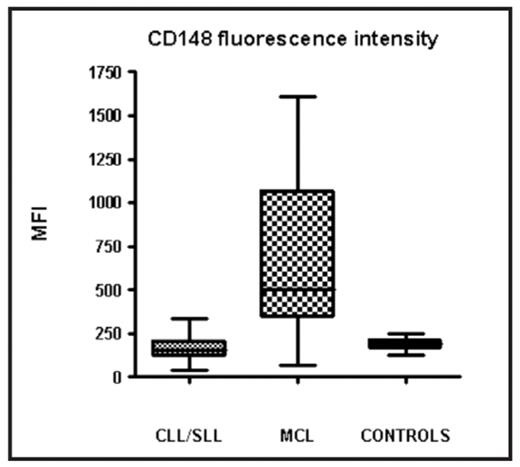Abstract
The diagnosis of mature B-cell neoplasms remains difficult in a number of cases, especially leukemic phases of non Hodgkin lymphomas, for which discriminating criteria or marker are often lacking. In order to identify new surface markers, we developed an original proteomic approach based on mass spectrometry analysis of plasma membrane microparticles derived from chronic B-cell lymphoproliferations: chronic lymphocytic leukemia/ small cell lymphoma (CLL/SLL) and mantle cell lymphoma (MCL). The approach consisted of protein extraction from plasma membrane microparticles (MPs), generated following actinomycin D stimulation and recovered using differential centrifugation. The complex protein mixture was further separated using 1D-gel electrophoresis separation and gel bands were systematically cutted at 2 mm intervals, trypsin digested and the resulting peptide mixtures was subsequently analysed by tandem mass spectrometry prior to protein identification. The lists of the proteins obtained for each pathology were then examined with respect to the membrane localization of the proteins in order to fulfill biological requirements needed for its further clinical use. Comparison of the lists of the proteins obtained for each pathology identified CD148, a membrane receptor with phosphatase activity, as a candidate for a discriminating marker detected in MCL but not in CLL in this approach. Flow cytometry studies, performed on 55 patients and 10 controls, showed that an anti-CD148 antibody stained significantly higher MCL (n=22) than CLL/SLL (n=33) circulating cells (p<0.0001). Even if the reason of such a regulated expression of CD148 remains unknown, our results indicate that a medium or high CD148 expression level may exclude the diagnosis of CLL/SLL and high CD148 expression levels may be strongly in favor of MCL diagnosis.
Disclosures: No relevant conflicts of interest to declare.
Author notes
Corresponding author


This feature is available to Subscribers Only
Sign In or Create an Account Close Modal